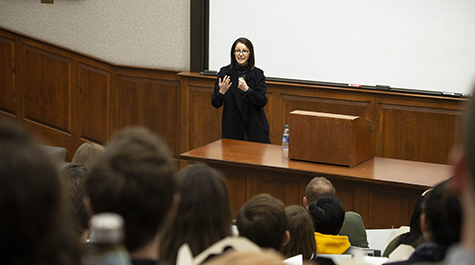William & Mary Law School Hosts BU’s Danielle Citron for Annual George Wythe Lecture
Professor Danielle K. Citron presented William & Mary Law School’s Annual George Wythe Lecture on Monday, March 2.
Citron is a Professor of Law at Boston University School of Law where she teaches and writes about privacy, free speech and civil procedure.
Introducing her to the William & Mary community in the Law School’s largest, jam-packed classroom, Dean Davison M. Douglas praised Citron as “a terrific teacher, a terrific scholar and someone who is engaged with the world.”
“She helped the Maryland State Senate draft a bill that criminalizes non-consensual publication of nude images, which was passed into law,” Douglas said. “She served as an advisor to California Attorney General Kamala Harris in her taskforce battling cyber exploitation and violence against women, and she is a tremendously respected scholar.”
Citron’s lecture, “The Data Death Penalty and Other Privacy Protections for Intimate Information,” examined the booming business of surveillance of our intimate lives and the many ways companies collect, survey, use, process and share intimate information about us. Citron argued that realities of the modern marketplace compromise longstanding commitments to sexual privacy.
Citron catalogued instances of sexual surveillance in modern life, for example through what she referred to as “the internet of intimate things”—from fertility tracking apps to cloud-based voice service Alexa in hotel rooms. She noted that high-traffic websites like Pornhub commodify our sexual secrets, selling access to social media companies like Facebook and allowing data brokers to amass dossiers on us.
Citron went on to talk about the importance of sexual privacy, the values that it protects, and how it is upended by the booming business of surveillance of our intimate lives. She stressed the cost to our economic, physical and emotional well-being.
“Sexual privacy is key to dignity, in the way we see ourselves as choosers of who gets to see and share information about us,” Citron said. “But sexual privacy is also about personal integrity; we get to be seen as a fully integrated person, not just a part.”
She also touched upon the economic costs of exploitation of data when employers get access to intimate data about us. The result, for example, could lead to losing a promotion or getting stuck with higher insurance premiums.
Citron argued for a new commitment to sexual privacy and warned against over-collection of intimate information. A first step would entail recognizing sexual privacy as a civil right. Second, she urged that strong privacy rules are needed for collection and use of personal data. She suggested the government even impose a “data death penalty”— if companies don’t adhere to baseline rules protecting intimate privacy, they should be barred from processing this data.
Bold ideas and original thinking earned Citron a MacArthur Fellowship in September 2019, one of the highest honors available to researchers, writers, scientists, artists, entrepreneurs and thought leaders of all stripes. In 2015, Prospect Magazine designated Citron as one of the World’s 50 Top Thinkers.
Citron’s book, Hate Crimes in Cyberspace (Harvard University Press) was named one of the “20 Best Moments for Women in 2014” by Cosmopolitan magazine. Citron’s scholarship has appeared in the Yale Law Journal, California Law Review (twice), Michigan Law Review (twice), Boston University Law Review (three times), Notre Dame Law Review (twice), Fordham Law Review (twice), George Washington Law Review, Minnesota Law Review, Texas Law Review, Washington University Law Review (three times), Southern California Law Review, Washington & Lee Law Review, Wake Forest Law Review, Washington Law Review (twice), UC Davis Law Review and other journals. She has written opinion pieces for the New York Times, Atlantic, Slate, Time, CNN, Guardian, New Scientist, Lawfare, ars technica, Forbes, and the New York Daily News.
Citron is the vice president of the Cyber Civil Rights Initiative, a nonprofit devoted to the protection of civil rights and liberties in the digital age. She serves on the board of directors of the Electronic Privacy Information Center and Future of Privacy and on the advisory boards of the Anti-Defamation League’s Center for Technology and Society and Teach Privacy. In connection with her advocacy work, she advises tech companies on online safety. She serves on Twitter’s Trust and Safety Council and Facebook’s Nonconsensual Intimate Imagery Task Force.
Citron’s paper will be published in an upcoming issue of the William & Mary Law Review.
The George Wythe Lecture Series began at the Law School in 1976. Wythe (1726-1806) was a distinguished lawyer, statesman, and judge, and mentor to Thomas Jefferson. In 1779, at Jefferson’s urging, he was appointed as William & Mary’s—and the nation’s—first professor of law.
About William & Mary Law School
Thomas Jefferson founded William & Mary Law School in 1779 to train leaders for the new nation. Now in its third century, America's oldest law school continues its historic mission of educating citizen lawyers who are prepared both to lead and to serve.
